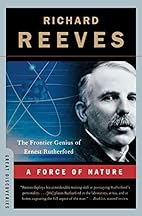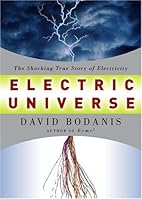Me and my science books!
Force of Nature: The Frontier Genius of Ernest Rutherford - Richard Reeves, 208 pages
I was a chemistry major in university and now I teach physics, so I had heard of Rutherford, in terms of the Bohr-Rutherford model of the atom. But I didn't realize how big an influence Ernest Rutherford had in the first half of the 20th century science. It was Rutherford the experimental physicist and Einstein the theoretical physicist who dominated all the research being done and were considered the yin and yang of physics.
Rutherford was a loud guy from New Zealand who blustered his way into Cambridge. He worked for a time, heading the physics department at McGill University in Montreal. I was excited to learn there is a room dedicated to his research there, and will be near the top of my list to visit, after some Montreal smoked meat meals when I get to Montreal some day.
Overall my impression was of how exciting it must have been in those days as all the big names, Bohr, Maxwell Clark, Einstein, Thompson, were all making huge and profound discoveries for about 30 years. Rutherford was in the middle of it all, and I very much enjoyed reading about the heydays of science. This book is part of a series called Great Discoveries, all written by different authors, have all been good, concise and interesting. I'm interested in the Alan Turing and Richard Feynman books next.
Electric Universe: The Shocking True Story of Electricity - David Bodanis, 320 pages
Bodanis' book E=mc2 was one of my favourite physics books so I was excited to find this book of his about electricity. I ended up being a bit disappointed in the read, although it covered a lot of the big ideas. But just because it wasn't what I expected, doesn't mean it wasn't interesting. Maybe I know too much of some parts, and I didn't know all of it, but those parts aren't exactly what I would have included.
We start with Wires, and look at Samuel Morse and Joseph Henry developing the electromagnet and the telegraph, leading to the idea of things (electrons) flowing through wires. I thought we would start with Volta and the battery or Ben Franklin and the kite and charges. At this point, I realized Bodanis was somewhat dumbing down the science. He uses analogies, which is good, but he never takes the next step to include the actual science. So, this makes the book more of a introduction for non-science people.
Next up was Alexander Graham Bell and Thomas Edison and JJ Thompson. Loved the Bell stuff, and it reminded me there is a Charlotte Gray biography I want to get to. (Reluctant Genius: Alexander Graham Bell and the Passion for Invention) Now how you can discuss Edison and his role in development of electricity without getting into his feud with Nicola Tesla over alternating current is a complete missed opportunity. Any opportunity to include Tesla and the crazy that is him should always be taken. (watch this great short bio of Tesla by Hank Green here, and enjoy the puppets!)
Now Waves. Correctly include Farraday and his theory of fields but it is left rather vaguely in its description. Fields are challenging to understand, but we expect high school students to develop an understanding and that's when I thought this book is much lower than high school. Cyrus Field and the transatlantic cable was something I wasn't familiar with but having read a book about Marconi, and waves in the air, felt like this was missing something. Bodanis kept talking about electromagnetic waves but kept it simple, and James Clerk Maxwell but this section still felt lacking.
Wave Machines gets us to Power in the Air and the development of radar during the wars which was good. I did like Heinrich Hertz's diary excerpts. Computer development is next, up to the invention of the transistor, with some good stuff on Alan Turing, which also reminded me there is a Great Discovery book on Turing, plus the Benedict Cumberbatch movie to watch.
I was not expecting the last section, The Brain and Beyond, looking into nerve transmission and the study of squids, and then neurotransmitters and development of Prozac. It really is a form of electricity and passing of charges.
So, overall, wasn't the level of science I wanted, but still had some interesting information. Bodanis does a good job of tying the development of ideas to practical situations like the British trying to identify the German planes using electromagnetic radar and his writing is not intimidating at all.


No comments:
Post a Comment
Thanks for commenting, so nice of you to visit.
(I'll try without the letters for a while - so please dont be a spammer! Let's try no anonymous users)